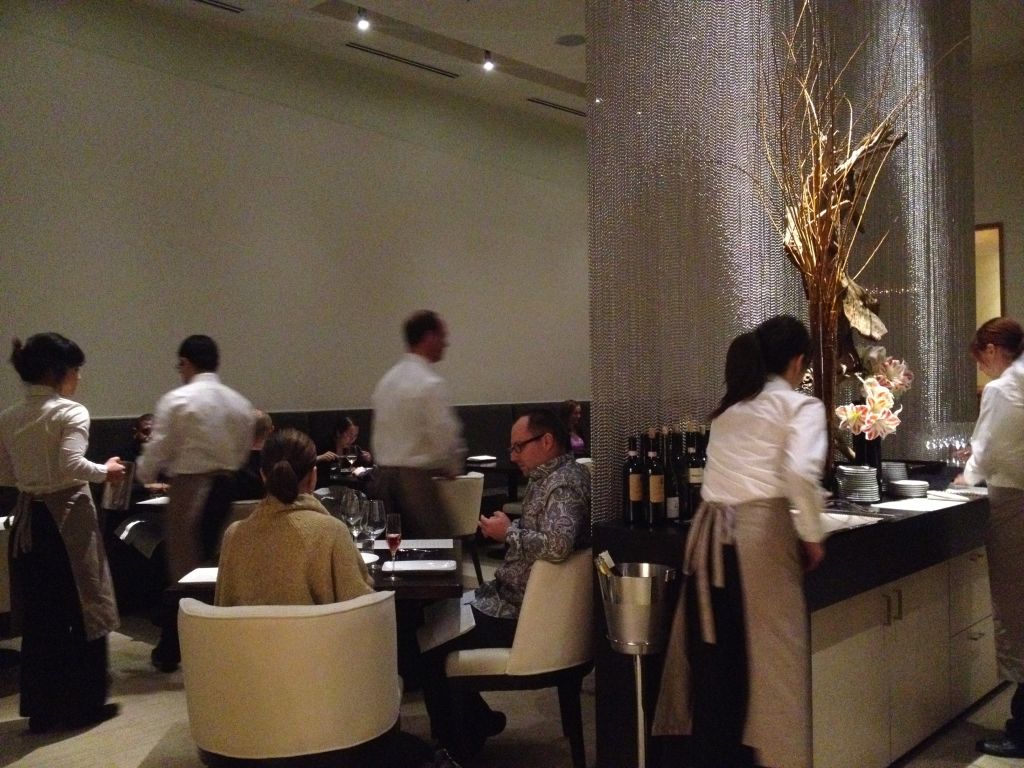
Top 5 Most Annoying Things Servers Say
By virtue of my job, I eat out. A lot. So I’ve started to see patterns in how service staffs have been trained; in some cases, by corporate monoliths eager for profits and positive customer service surveys. I never really paid much attention, until I came back from Asia last week, where they present you with a menu, take your order and bring you your food. Chitchat is kept to a minimum, as they must surely realize that if you’re dining with others, you might want to actually speak with the people at your table, rather than have to be lectured to about the minutiae of the menu.
1. “Have you dined with us before?”
Who cares? This one is especially awkward if one person has and the other has not. It happened to me at The Purple Pig this week at lunch, but honestly, it happens to me just about everyday. Dining with a couple who had never been, we were asked this question. Even though I have eaten there several times, and could obviously guide my guests through a meal, I felt like it made my guests feel inferior, like they had been missing out on a crucial and important piece of culinary inside information. Since I indicated I had dined there before, why not just say, “great, then you can fill them in on how things work and I’ll be back in a minute.” Instead, despite my alleged “prior experience” at the restaurant – it required this next query…
2. “Can I explain how the menu works?”
Really? Are the menus written in Spanish? Do they come with their own instruction manual? Are we supposed to make origami from them and then order? This question was posed to our group Sunday night at the new Store Front Company in Bucktown. As much as the restaurant is striving to be something it never will be – a three-star restaurant in a sea of casual, neighborhood friendly joints (see: Chaise Lounge’s eventual transformation into The Southern) – our server had to actually tell us how the menu “worked.” Let’s see, there’s a section called “share” and another called “cheese” and another called “first” and “second.” I think I can figure out how things work, especially based on the prices: $12 for five thumb-sized meatballs; $28 for a pork entree that looked like an appetizer; despite finishing only half and telling our server we didn’t care for it, she still charged us. If you’re going to stick it to us no matter how bad a dish is, that‘s a menu strategy I’d love to know about ahead of time.
3. “Are you still working on that?”
Someone in the hospitality industry here, who happens to run a group of successful restaurants, told me once he trains his staff never to ask this awkward question, but rather, “are you still enjoying that, or should I remove it for you?” C’mon folks, you don’t have to train your bussers to talk like construction foremen.
4. TIE:
– “Most people order about two to three plates each.”
– “Would you like to start with some _____ or maybe a plate of ________ while I get your drinks?”
Both of these are sort of the same thing, classic up-sell attempts. Straight from the TGIF employee handbook, this suggestive remark puts the diner in an immediate defensive position. ‘Gee, should I get two small plates even if I only was planning on a drink and a small bite? I don’t want to look like a cheap skate here with my date..’ As for the question about starting things off before we’ve even ordered, if I wanted a plate of calamari or lamb meatballs while I look at the menu, I’ll let you know, thanks.
5. [In response to negative feedback about a dish] “Really? Most people just love that dish.”
Do I really care what other people think? You asked me how everything was, and I gave you my honest feedback, hoping that it would help you make adjustments or at least give the kitchen a heads-up about something that didn’t sit well with a guest. The way you answer – and more important, the way you respond – will determine whether or not the guest will bother to return. If you work for Danny Meyer, it means a brief apology, an indication that you’ll let the kitchen know, and most likely, a chance to try something else from the menu or a comped dessert or glass of wine. Simple, simple stuff. To put the onus back on the guest, and make them feel like they have to defend themselves, is just preposterous. If everyone on Yelp loves something at a restaurant, and the night you go there it’s undercooked or just not to your liking, who cares if the majority of people liked it? The key is, you didn’t like it, and rather than leave dissatisfied, why not have the opportunity to try something else? It will certainly earn you loyalty rather than enmity.
Honorable mention:
Is everything here delicious?!

